- Home
- Michael Cunningham
Hours Page 4
Hours Read online
Page 4
So now she is Laura Brown. Laura Zielski, the solitary girl, the incessant reader, is gone, and here in her place is Laura Brown.
One page, she decides; just one. She isn't ready yet; the tasks that lie ahead (putting on her robe, brushing her hair, going down to the kitchen) are still too thin, too elusive. She will permit herself another minute here, in bed, before entering the day. She will allow herself just a little more time. She is taken by a wave of feeling, a sea-swell, that rises from under her breast and buoys her, floats her gently, as if she were a sea creature thrown back from the sand where it had beached itself—as if she had been returned from a realm of crushing gravity to her true medium, the suck and swell of saltwater, that weightless brilliance.
She stiffened a little on the kerb, waiting for Durtnall's van to pass. A charming woman, Scrope Purvis thought her (knowing her as one does know people who live next door to one in Westminster); a touch of the bird about her, of the jay, blue-green, light, vivacious, though she was over fifty, and grown very white since her illness. There she perched, never seeing him, waiting to cross, very upright.
For having lived in Westminster—how many years now? over twenty,—one feels even in the midst of the traffic, or waking at night, Clarissa was positive, a particular hush, or solemnity; an indescribable pause; a suspense (but that might be her heart, affected, they said, by influenza) before Big Ben strikes. There! Out it boomed. First a warning, musical; then the hour, irrevocable. The leaden circles dissolved in the air. Such fools we are, she thought, crossing Victoria Street. For Heaven only knows why one loves it so, how one sees it so, making it up, building it round one, tumbling it, creating it every moment afresh; but the veriest frumps, the most dejected of miseries sitting on doorsteps (drink their downfall) do the same; can't be dealt with, she felt positive, by Acts of Parliament for that very reason: they love life. In people's eyes, in the swing, tramp, and trudge; in the bellow and the uproar, the carriages, motor cars, omnibuses, vans, sandwich men shuffling and swinging; brass bands; barrel organs; in the triumph and the jingle and the strange high singing of some aeroplane overhead was what she loved; life; London; this moment of June.
How, Laura wonders, could someone who was able to write a sentence like that — who was able to feel everything contained in a sentence like that — come to kill herself? What in the world is wrong with people? Summoning resolve, as if she were about to dive into cold water, Laura closes the book and lays it on the nightstand. She does not dislike her child, does not dislike her husband. She will rise and be cheerful.
At least, she thinks, she does not read mysteries or romances.
At least she continues to improve her mind. Right now she is reading Virginia Woolf, all of Virginia Woolf, book by book — she is fascinated by the idea of a woman like that, a woman of such brilliance, such strangeness, such immeasurable sorrow; a woman who had genius but still filled her pocket with a stone and waded out into a river. She, Laura, likes to imagine (it's one of her most closely held secrets) that she has a touch of brilliance herself, just a hint of it, though she knows most peo ple probably walk around with similar hopeful suspicions curled up like tiny fists inside them, never divulged. She wonders , while she pushes a cart through the supermarket or has her hair done, if the other women aren't all thinking, to some degree or other , the same thing: Here is the brilliant spirit, the woman of sorrows, the woman of transcendent joys, who would rather be elsewhere, who has consented to perform simple and essentially foolish tasks, to examine tomatoes, to sit under a hairdryer, because it is her art and her duty. Because the war is over, the world has survived, and we are here, all of us, making homes, having and raising children, creating not just books or paintings but a whole world — a world of order and harmony where children are safe (if not happy), where men who have seen horrors beyond imagining, who have acted bravely and well, come home to lighted windows, to perfume, to plates and napkins.
What a lark! What a plunge!
Laura gets out of bed. It is a hot, white morning in June. She can hear her husband moving around downstairs. A metal lid kisses the rim of its pan. She takes her robe, pale aqua chenille, from the newly reupholstered chair and the chair appears, squat and fat, skirted, its nubbly salmon-colored fabric held down by cord and salmon-colored buttons in a diamond pattern. In the morning heat of June, with the robe whisked away, the chair in its bold new fabric seems surprised to find itself a chair at all.
She brushes her teeth, brushes her hair, and starts downstairs. She pauses several treads from the bottom, listening, waiting; she is again possessed (it seems to be getting worse) by a dreamlike feeling, as if she is standing in the wings, about to go onstage and perform in a play for which she is not appropriately dressed, and for which she has not adequately rehearsed. What, she wonders, is wrong with her. This is her husband in the kitchen; this is her little boy. All the man and boy require of her is her presence and, of course, her love. She conquers the desire to go quietly back upstairs, to her bed and book . She conquers her irritation at the sound of her husband's voice, saying something to Richie about napkins (why does his voice remind her sometimes of a potato being grated?). She descends the last three stairs, crosses the narrow foyer, enters the kitchen.
She thinks of the cake she will bake, the flowers she'll buy. She thinks of roses surrounded by gifts.
Her husband has made the coffee, poured cereal for himself and their son. On the tabletop, a dozen white roses offer their complex, slightly sinister beauty. Through the clear glass vase Laura can see the bubbles, fine as grains of sand, clinging to their stems. Beside the roses stand cereal box and milk carton, with their words and pictures.
"Good morning," her husband says, raising his eyebrows as if he is surprised but delighted to see her.
"Happy birthday," she says.
" Thank you. "
"Oh, Dan. Roses. On your birthday. You're too much, really."
She sees him see that she is angry. She smiles.
"It wouldn't mean much of anything without you, would it?" he says.
"But you should have woken me. Really."
He looks at Richie, lifts his brows another centimeter, so that his forehead is creased and his lustrous black hair twitches slightly. "We thought it'd be better if you slept in a little, didn't we? " he says.
Richie, three years old, says, "Yes. " He nods avidly.
He wears blue pajamas. He is happy to see her, and more than happy; he is rescued, resurrected, transported by love. Laura reaches into the pocket of her robe for a cigarette, changes her mind, raises her hand instead to her hair. It is almost perfect, it is almost enough, to be a young mother in a yellow kitchen touching her thick, dark hair, pregnant with another child. There are leaf shadows on the curtains; there is fresh coffee.
"G'morning, Bug, " she says to Richie .
" I'm having cereal," he says. He grins. It could be said that he leers. He is transparently smitten with her; he is comic and tragic in his hopeless love. He makes her think sometimes of a mouse singing amorous ballads under the window of a giantess.
"Good," she answers. "That's very good."
He nods again, as if they share a secret.
"But honestly," she says to her husband.
"Why should I wake you?" he answers. " Why shouldn't you sleep?"
"It's your birthday," she says.
" You need to rest."
He pats her belly carefully but with a certain force, as if it were the shell of a soft-boiled egg. Nothing shows yet; the only manifestations are a certain squeamishness and a subtle but distinct inner churning . She and her husband and son are in a house in which no one but they have ever lived. Outside the house is a world where the shelves are stocked, where radio waves are full of music, where young men walk the streets again, men who have known deprivation and a fear worse than death, who have willingly given up their early twenties and now, thinking of thirty and beyond, haven't any more time to spare. Their wartime training stands them in
good stead. They are lean and strong. They are up at sunrise, uncomplaining.
"I like to make your breakfast," Laura says. "I feel fine."
"I can make breakfast. Just because I have to get up at the crack of dawn doesn't mean you have to."
" I want to."
The refrigerator hums. A bee thumps heavily, insistently, against a windowpane. Laura takes her pack of Pall Malls from the pocket of her robe. She is three years older than he (there is something vaguely disreputable about this, something vaguely embarrassing); a broad-shouldered woman, angular, dark, foreign-looking, although her family has been failing to prosper in this country for over a hundred years. She slides a cigarette out of the pack, changes her mind, slips it back in again.
"Okay," he says. "If you really want me to, tomorrow I'll wake you up at six."
"Okay."
She pours herself a cup of the coffee he's made. She comes back to him with the steaming cup in her hand, kisses his cheek. He pats her rump, affectionately and absent-mindedly. He is no longer thinking of her. He is thinking about the day that lies ahead of him, the drive downtown, the torpid golden quiet of Wilshire Boulevard, where all the stores are still locked up and only the most cheerful and dedicated figures, young early-risers like himself, move through sunlight still innocent of the day's smog. His office will be silent, the typewriters in the secretarial pool still shrouded, and he and a few of the other men his age will have a full hour or more to get caught up on paperwork before the phones start ringing. It seems sometimes to be impossibly fine that he should have all this: an office and a new two-bedroom house, responsibilities and decisions, quick joking lunches with the other men.
"The roses are beautiful," Laura tells him. "How did you get them this early?"
"Mrs. Gar is in her shop at six. I just kept tapping at the glass until she let me in." He looks at his watch, though he knows what time it is. "Hey, I've got to go."
" Have a good day."
" You too."
" Happy birthday."
" Thank you. "
He stands. For awhile they are all absorbed in the ritual of his leaving: the taking on of jacket and briefcase; the flurry of kisses; the waves, he from over his shoulder as he crosses the lawn to the driveway, Laura and Richie from behind the screen door. Their lawn, extravagantly watered, is a brilliant, almost unearthly green. Laura and Richie stand like spectators at a parade as the man pilots his ice-blue Chevrolet down the short driveway and into the street. He waves one last time, jauntily, from behind the wheel.
"Well, " she says, after the car has disappeared. Her son watches her adoringly, expectantly. She is the animating principle, the life of the house. Its rooms are sometimes larger than they should be; they sometimes, suddenly, contain things he's never seen before. He watches her, and waits.
"Well, now," she says.
Here , then , is the daily transition. With her husband present, she is more nervous but less afraid. She knows how to act. Alone with Richie, she sometimes feels unmoored — he is so entirely, persuasively himself. He wants what he wants so avidly. He cries mysteriously, makes indecipherable demands, courts her, pleads with her, ignores her. He seems, almost always, to be waiting to see what she will do next . She knows, or at least suspects, that other mothers of small children must maintain a body of rules and, more to the point, an ongoing mother-self to guide them in negotiating the days spent alone with a child. When her husband is here, she can manage it. She can see him seeing her, and she knows almost instinctively how to treat the boy firmly and kindly, with an affectionate maternal offhandedness that seems effortless. Alone with the child, though, she loses direction. She can't always remember how a mother would act.
" You need to finish your breakfast," she says to him .
" Okay," he says.
They return to the kitchen. Her husband has washed his coffee cup, dried it, put it away. The boy sets about eating with a certain tractorish steadiness that has more to do with obedience than appetite. Laura pours herself a fresh cup of coffee, sits at the table. She lights a cigarette.
. . . the triumph and the jingle and the strange high singing of some aeroplane overhead was what she loved; life; London; this moment of June.
She exhales a rich gray plume of smoke. She is so tired. She was up until after two, reading. She touches her belly—is it bad for the new baby, her getting so little sleep? She hasn't asked the doctor about it; she's afraid he'll tell her to stop reading altogether. She promises that tonight she'll read less. She'll go to sleep by midnight, at the latest.
She says to Richie, "Guess what we're going to do today? We're going to make a cake for your father's birthday. Oh , what a big job we have ahead of us. "
He nods gravely, judiciously. He seems unconvinced about something .
She says, " We're going to make him the best cake he's ever seen. The very best. Don't you think that's a good idea?"
Again, Richie nods. He waits to see what will happen next.
Laura watches him through the meandering vine of cigarette smoke. She will not go upstairs, and return to her book. She will remain. She will do all that's required, and more.
M r s . D a l l o w a y
Clarissa carries her armload of flowers out into Spring Street. She imagines Barbara still in the cool dimness on the far side of the door, continuing to live in what Clarissa can't help thinking of n ow as the past (it has to do, somehow, with Barbara's sorrow, and the racks of ribbons on the back wall) while she herself walks into the present, all this: the Chinese boy careening by on a bicycle; the number 281 written in gold on dark glass; the scattering of pigeons with feet the color of pencil erasers (a bird had flown in through the open window of her fourth-grade classroom, violent, dreadful); Spring Street; and here she is with a huge bouquet of flowers. She will stop by Richard's apartment to see how he's doing (it's useless to call, he never answers), but first she goes and stands shyly, expectantly, not too close to the trailer from which the famous head emerged. A small crowd is gathered there, mostly tourists, and Clarissa positions herself beside two young girls, one with hair dyed canary yellow and the other with hair dyed platinum. Clarissa wonders if they intended to so strongly suggest the sun and the moon.
Sun says to Moon, "It was Meryl Streep, definitely Meryl Streep."
Clarissa is excited, despite herself. She was right. There is a surprisingly potent satisfaction in knowing that her vision was shared by another.
" No way," says Moon. "It was Susan Sarandon."
It was not, Clarissa thinks, Susan Sarandon. It may have been Vanessa Redgrave but it was certainly not Susan Sarandon.
" No, " says Sun, "it was Streep. Trust me. "
"It was not Meryl Streep. "
"It was. It fucking was. "
Clarissa stands guiltily, holding her flowers, hoping the star will show herself again, embarrassed by her own interest. She is not given to fawning over celebrities, no more than most people, but can't help being drawn to the aura of fame—and more than fame, actual immortality—implied by the presence of a movie star in a trailer on the corner of MacDougal and Spring Streets. These two girls standing beside Clarissa, twenty if not younger, defiantly hefty, slouching into each other, laden with brightly colored bags from discount stores; these two girls will grow to middle and then old age, either wither or bloat; the cemeteries in which they're buried will fall eventually into ruin, the grass grown wild, browsed at night by dogs; and when all that remains of these girls is a few silver fillings lost under ground the woman in the trailer, be she Meryl Streep or Vanessa Redgrave or even Susan Sarandon, will still be known. She will exist in archives, in books; her recorded voice will be stored away among other precious and venerated objects. Clarissa allows herself to continue standing, foolish as any fan, for another few minutes, in hope of seeing the star emerge. Yes, just another few minutes, before the humiliation is simply too much to bear. She remains before the trailer with her flowers. She watches the door . After several minutes ha
ve passed (nearly ten, although she hates admitting it) she leaves suddenly, indignantly, as if she's been stood up, and walks the few blocks uptown to Richard's apartment.
This neighborhood was once the center of something new and wild; something disreputable; a part of the city where the sound of guitars drifted all night out of bars and coffeehouses; where the stores that sold books and clothing smelled the way she imagined Arab bazaars must smell: incense and rich, dung-y dust, some sort of wood (cedar? camphor?), something fruitily, fertilely rotting; and where it had seemed possible, quite possible, that if you passed through the wrong door or down the wrong alley you would meet a fate: not just the familiar threat of robbery and physical harm but something more perverse and transforming, more permanent. Here, right here, on this corner, she had stood with Richard when Richard was nineteen— when Richard was a firm-featured, hard-eyed, not-quite beautiful dark-haired boy with an impossibly long and graceful, very pale neck—here they had stood and argued ... about what? A kiss? Had Richard kissed her, or had she, Clarissa, only believed Richard was about to kiss her, and evaded it? Here on this corner (in front of what had been a head shop and is now a delicatessen) they had kissed or not kissed, they had certainly argued, and here or somewhere soon after, they had canceled their little experiment, for Clarissa wanted her freedom and Richard wanted , well, too much, didn't he always? He wanted too much. She'd told him that what happened over the summer had been exactly that, something that happened over a summer. Why should he want her, a wry and diffident girl, no breasts to speak of (how could she be expected to trust his desire?), when he knew as well as she the bent of his deepest longings and when he had Louis, worshipful Louis, heavy-limbed, far from stupid, a boy Michelangelo would have been pleased to draw? Wasn't it, really, just another poetic conceit, Richard's idea of her? They had not had a large or spectacular fight, just a squabble on a corner—there had been no question, even then , of deep damage to the friendship—and yet as she looks back it seems definitive; it seems like the moment at which one possible future ended and a new one began. That day, after the argument (or possibly before it), Clarissa had bought a packet of incense and a gray alpaca jacket, secondhand, with rose-shaped buttons carved out of bone. Richard had eventually gone off to Europe with Louis. What, Clarissa wonders now, ever became of the alpaca jacket? It seems that she had it for years and years, and then suddenly didn't have it anymore .

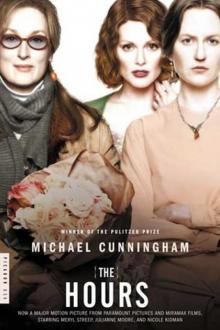 The Hours
The Hours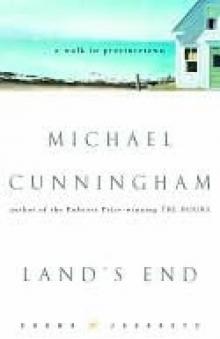 Land's End: A Walk in Provincetown
Land's End: A Walk in Provincetown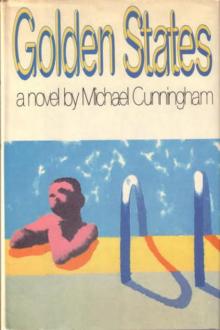 Golden States
Golden States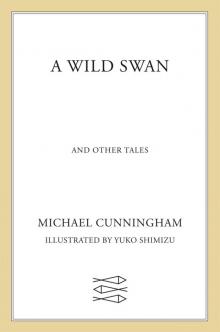 A Wild Swan
A Wild Swan A Home at the End of the World
A Home at the End of the World Flesh and Blood
Flesh and Blood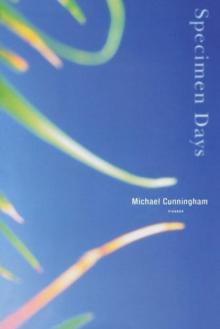 Specimen Days
Specimen Days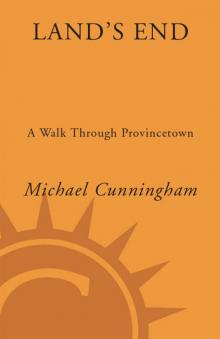 Land's End
Land's End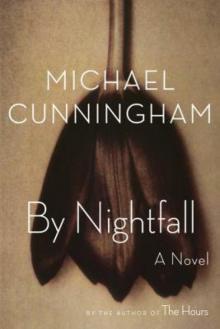 By Nightfall
By Nightfall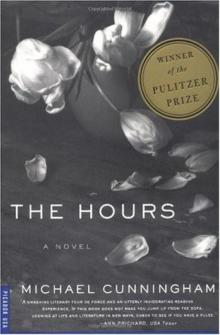 Hours
Hours